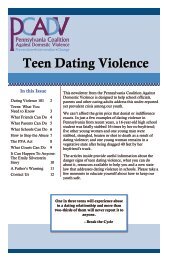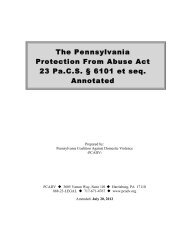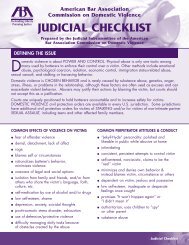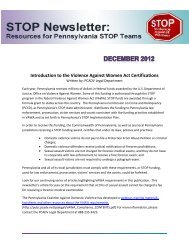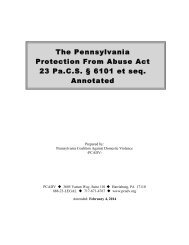Toolkit with Report Form - Pennsylvania Coalition Against Domestic ...
Toolkit with Report Form - Pennsylvania Coalition Against Domestic ...
Toolkit with Report Form - Pennsylvania Coalition Against Domestic ...
Create successful ePaper yourself
Turn your PDF publications into a flip-book with our unique Google optimized e-Paper software.
Community Response<br />
This information can help community leaders* identify and access community<br />
resources in the immediate aftermath of a critical incident. These resources<br />
will have lasting impact as the community honors those lost and remembers<br />
the incident across generations. Programs may want to share this chapter<br />
<strong>with</strong> other community leaders and maintain it as a reference for follow-up to<br />
crisis interventions.<br />
Section seven<br />
No disaster, crisis or traumatic event happens<br />
in a vacuum. Those affected are more likely to<br />
recover <strong>with</strong> the support of those around them<br />
– partners, children, family, co-workers, faith<br />
communities, and the community <strong>with</strong>in which<br />
they live and interact daily. Envision ripples<br />
in a pond when a stone is cast; this is similar<br />
to the rippled effect trauma may have when<br />
cast into the life of a survivor. Community<br />
responses to a traumatic event work to<br />
address the needs of those “rippled” around<br />
the survivor(s) and begin to repair the social<br />
fabric connecting the smaller communities of<br />
interest and the greater community at large.<br />
*Community leader is loosely defined for<br />
these purposes as someone who has:<br />
• A leadership role across the entire<br />
community in question<br />
• Guidance <strong>with</strong>in smaller communities<br />
that contribute to community-wide social<br />
fabric<br />
• Expressed or informally established<br />
influence and/or access to community<br />
leaders who have express authority<br />
to make decisions about community<br />
services and resource allocation<br />
In this section you will find information about:<br />
Individual and<br />
Community Crisis Reaction<br />
◗ How communities react to traumatic events<br />
◗ How community-wide responses can help<br />
<strong>Domestic</strong> Violence Intersections<br />
<strong>with</strong> Collective Trauma<br />
◗ Victims living in the community may have<br />
intense reactions to a domestic violence<br />
fatality or near fatality<br />
◗ Education about crisis reactions and<br />
resources is important for all members of the<br />
community<br />
Honoring Victims<br />
◗ Considerations for planning memorials<br />
◗ Co-workers and classmates may want to<br />
participate in planning<br />
Community Awareness Events –<br />
Ideas To Help You Get Started<br />
◗ Links to some national and local initiatives<br />
honoring victims of domestic violence<br />
◗ Awareness is more than a month<br />
When Crisis Strikes | <strong>Pennsylvania</strong> <strong>Coalition</strong> <strong>Against</strong> <strong>Domestic</strong> Violence | 2012<br />
page 49



